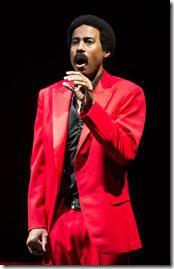
Unspeakable
Written by Rod Gailes OBC
and James Murray Jackson, Jr.
Broadway Playhouse, 175 E. Chestnut (map)
thru Nov 8 | tix: $35-$79 | more info
Check for half-price tickets
Fictionalized journey through Richard Pryor’s real-life hell
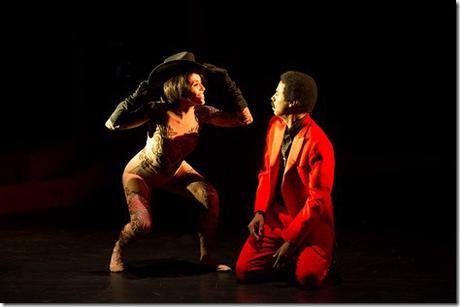
Broadway in Chicago presents
Unspeakable
Review by John Olson
Shortly after a young-looking couple took their seats next to me, the woman of the pair asked her male companion, “so is there any background information I should have?” Presuming she was referring to the play about to begin (and not to background about her date); I wondered to myself if she knew anything about Richard Pryor, the subject of Unspeakable. Pryor passed away just 10 years ago, but his career effectively ended in the late 1980s after he was diagnosed with MS and suffered a severe heart attack. So, it was quite likely this young woman was not familiar with the work of Richard Pryor, who faded from the scene probably about the time this woman was born. If in fact she was not familiar with his body of work, (a) she ought to look up his routines on YouTube and his movies on Netflix and (b) she was at a disadvantage watching Unspeakable.
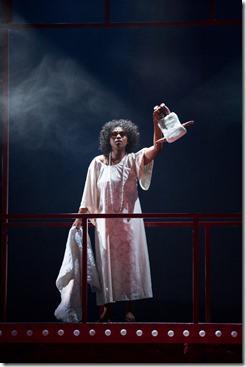
There’s a poster in the lobby with the disclaimer that Unspeakable is “inspired by known facts about a public figure in order to offer a perspective on the entertainment business, race, human nature (and/or whatever you take away from the experience). Otherwise it is work of fiction, and any resemblance to actual events or persons, living or dead, is entirely coincidental and not intended.” That said, the play follows the outlines of Pryor’s life rather closely. Pryor was born in a Peoria, Illinois brothel operated by his grandmother. His mother was one of the prostitutes, and his father a pimp. As a child, he suffered physical, mental and sexual abuse. Unspeakable’s conceit is that this story is told as a flashback imagined by a semi-comatose Richard as he sits in a wheelchair, suffering from MS shortly before his death in 2005. The story is told in not-entirely-chronological order, and the characters aren’t always clearly introduced or their relationship to Richard identified, so it’s initially hard to follow. What emerges, though, is how an abusive childhood was followed by great success in the entertainment world (primarily television and nightclubs – Pryor’s film career isn’t mentioned) and then followed by physical and emotional abuse of the people closest to Richard – primarily his wives, but also his male friends and business associates.
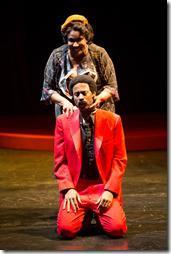
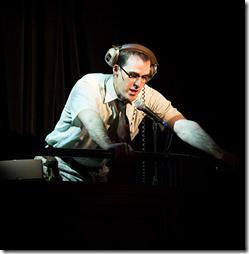
As a depiction of the demons haunting Richard, Unspeakable is uncompromising. Some of those demons are memories of his parents – the father who abused both Richard and his mother before leaving them; the harsh madam who was his grandmother (fiercely played by E. Faye Butler) and even a humanoid female rat (Taryn Reneau). The action is played out on Felix E. Cochren’s non-realistic set of various frames, with a hellish red palette and lighting schemes by Jorge Arroyo that are alternately harsh and mysterious – encompassing both the bright lights of show business and the dark corners of memory.
In the central role of Richard, Jackson gives an intense performance of nonstop manic energy, as the character demands. He approximates the look and sound of the real Pryor and communicates the fears and delusions of this very troubled boy and man boy. This is a World Premiere and Gailes and Johnson will certainly continue to work on it. There’s much potential here, but this hellish vision of abuse is at present stuck in a purgatory between a real biography and a true work of fiction. The piece might work better if freed entirely of any suggestion that it was inspired by Pryor’s life. The writers could give us more detail on the fictional “Richard” and show why we should care about him. On the other hand, if they could get the cooperation of Pryor’s estate and include some of the material that would show (or remind) audiences why his work was important and ground-breaking, it could become a legitimate and still very moving biography. Either way, Unspeakable could become the modern-day tragedy it seems to aspire to be.
Rating: ★★½
Unspeakable continues through October 8th at Broadway Playhouse, 175 E. Chestnut (map), with performances Tuesdays-Fridays at 7:30pm, Saturdays 2pm and 8pm, Sundays 2pm and 7:30pm. Tickets are $35-$79, and are available by phone (800-775-2000) or online at Ticketmaster.com (check for half-price tickets at Goldstar.com). More info at BroadwayInChicago.com. (Running time: 2 hours 30 minutes, includes an intermission)
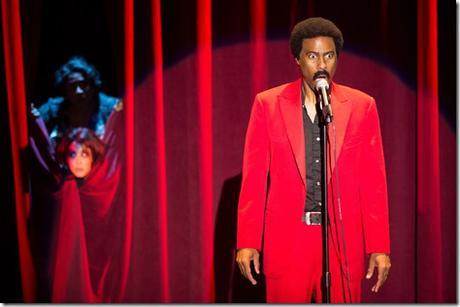
Photos by Justin Barber Photography
artists
cast
James Murray Jackson, Jr. (Richard), E. Faye Butler (Mama), Ronald L. Conner (Moody, Bucky, Ensemble), Taryn Reneau (Rat, Jessica, Ensemble), Chris Amos (Smitty, Jimmy, Roxy, Mike Douglas, Ensemble), Kierra Bunch (Hildegarde, Debbie, Lady Friend, Ensemble), Ginneh Thomas (Shelly, Lola, Ensemble), Lamar N. Barnes, Ebony Joy, Akilah Perry (Ensemble)
behind the scenes
Rod Gailes OBC (conception, co-writer, director), Felix E. Cochren (scenic design), Jorge Arroyo (lighting design), Aria Music Designs (sound design & composed music), Nick Sandys (fight direction), Mealah Heindenreich (props design), Deya Friedman (production stage manager), William Collins (assistant stage manager), Tony D’Angelo (general management), Amy Hall Garner (choreography), Aaron Shapiro (production management), The Abrams Group, LLC (company management), Justin Barber Photography (photos)
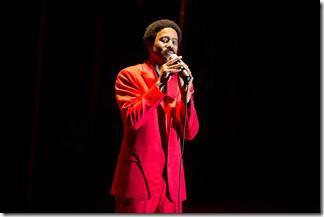
15-1027

